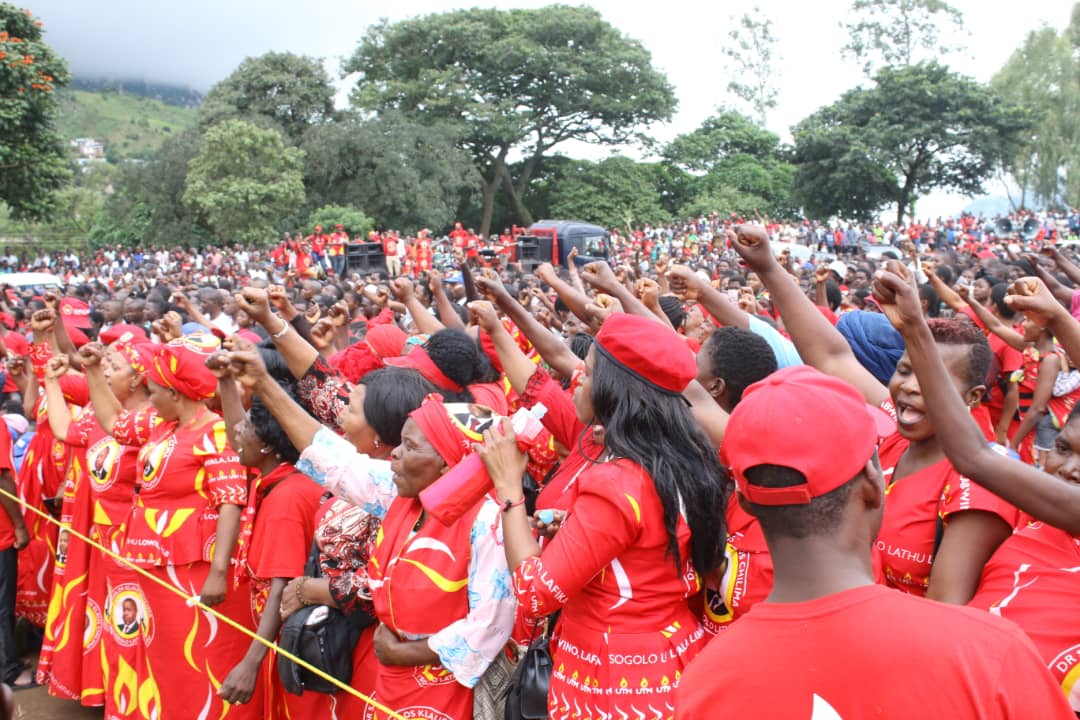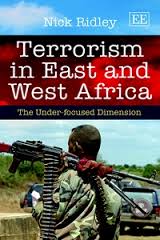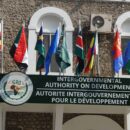“Why now?” Mass promotions raise eyebrows ahead of Malawi elections

Civil society and opposition groups question why the government gave pay raises to thousands of public workers in the run-up to the tight election.

UTM (rally pictured) is one of the parties to suggest the government’s promotions are politically motivated ahead of the Malawi elections. Credit: UTM.
A day before Malawi goes to the polls for general elections, the opposition is accusing the government of using promotions to sway the results. In April 2019, just a month before tomorrow’s tight contest, the government gave 20,000 teachers and 7,000 police officers pay raises. This prompted civil servants to also demand better working conditions and threaten a mass strike. The government reportedly conceded to their calls before the deadline late last week, though the details of the promotions remains unclear.
In response to protestations, President Peter Mutharika and the ruling Democratic Progress Party (DPP) insist that the decision to increase the salaries of tens of thousands of public workers is unrelated to the upcoming 21 May election.
“These were the people due for promotions and, by coincidence, people want to make an issue out of it,” Minister of Information Henry Mussa told African Arguments. “People are entitled to their views, but as government we will not stop providing social and economic services. So stop speculating; it will not help in the development of this country.”
But many are unconvinced. Timothy Mtambo is the chair of Human Rights Defenders Coalition, which represents a group of local rights organisations.
“Police and teachers have a direct role [as presiding officers in polling stations] in elections,” he said. “Hence we are questioning the motive behind the promotions…These teachers and police officers have stayed for years without promotions. Why now?”
Some others were less concerned by the timing, but questioned why only certain groups had been rewarded. The Malawi Prison Service and Civil Servants Trade Union (CSTU), for example, called for equal treatment before Election Day. CSTU issued a letter to the government demanding that the government issue promotions to civil servants according “the same criteria and methodology which applied to fellow workers in teaching and police services”.
The Malawi Congress of Trade Unions (MCTU) takes a similar perspective.
“There is no justification for promoting only the police and teachers,” Dennis Kalekeni, secretary-general of the MCTU, told African Arguments.
He suggested that the limited promotions could have been due to an oversight by the government rather than a deliberate political ploy. “Teachers make a lot of human capital and their cries become louder than the other professionals,” he said.
Kalekeni was also keen to express his support for the promotions in general. “Let me be clear that as a trade union whose mandate is to advocate for better working conditions, we don’t mind the timing of the promotions,” he said. “When election time comes, workers reposition themselves on how better they can negotiate for better salaries and there is nothing wrong with that.”
A strategy to win?
For opposition parties, however, this is a clear political strategy on the part of President Mutharika. The incumbent is in a presidential race that is too close to call. His key challengers are Lazarus Chakwera of the main opposition Malawi Congress Party (MCP) and Vice-President Saulos Chilima of the United Transformation Movement (UTM).
The UTM has been making an issue of the promotions on the campaign trail and see them as a way to buy support.
“We believe that the promotions were politically-motivated,” says UTM spokesperson Chidanti Malunga. “The major aim is that the promoted people should support [the ruling DPP]…Some of the promoted people were found to be deceased or out of the service, which shows that it was done in haste and that is incorrect. It was not done on merit and that is a huge mistake.”
Others such as Mtambo from the Human Rights Defenders Coalition see the pay raises as part of a broader electoral tactic. He points out that the government has also implemented various development projects in recent months. This includes some initiatives that have seemingly been rushed ahead of the elections such as a new road construction in Rumphi District that has developed potholes just weeks after completion.
Local civil society groups and opposition parties are also questioning where the money to pay for promotions will come from. The increased salaries were not included in Malawi’s current budget, while the increased spending goes against the recommendations of the International Monetary Fund (IMF) and World Bank for the government to control its wage bill.
This is a challenge that will have to be tackled in the coming months and years. And tomorrow, Malawian voters will decide who should be the ones to address it.
[Malawi elections: A three-horse race too close to call]
President Mutharika, who won with 36.4% in 2014, is hoping he has done enough to earn a second term. Chakwera of the MCP will aim to improve on his previous second-placed 27.8%. And Vice-President Chilima, who defected from the ruling party in 2018 and is attempting to attract votes from young people and urban voters, is also in with a chance.







“Why now?” Mass promotions raise eyebrows ahead of Malawi elections | African Arguments
[url=http://www.g6z40qf7t29e60be9ii074yl789x7docs.org/]uypikqsvtl[/url]
ypikqsvtl http://www.g6z40qf7t29e60be9ii074yl789x7docs.org/
aypikqsvtl